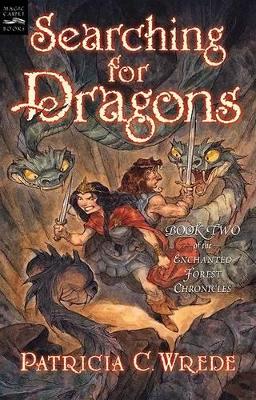
Kate (Blogging with Dragons)
Written on Sep 4, 2017
Rating: 3.5 stars
I never liked this book as much as its predecessor in the Enchanted Forest Chronicles and find I like it even less as an adult. It is still a very fun read, but I don’t like that the book is no longer centered upon Cimorene, her acceptance of Mendanbar’s proposal and the distinct lack of titular dragons.
Though this entry in the series still features Princess Cimorene, she is not the narrator or the main protagonist of the book. Instead, the King of the Enchanted Forest, Mendanbar, narrates. Though Mendanbar is a perfectly fine King and immediately recognizes Cimorene for her intelligence, resourcefulness, and bravery, which allots him some brownie points in my mind, I just don’t find his insights into things as interesting or as funny as Cimorene’s. And I really don’t see what attracts her to him in the first place, as his only distinction from the other quirky and remarkable characters is that he’s quite plain.
If I couldn’t have a book narrated by Cimorene again, I would have much rather read a book narrated by the witch, Morwen, than this one narrated by him. This could just be that I begrudge Mendanbar for not getting to read about Cimorene’s exploits as Chief Cook and Librarian for the King of Dragons, however. Admittedly, I could not help but to think there had to be a more interesting story to tell that involved Cimorene and her job description. Instead, our lovable heroine is sidelined to tagging along with Mendanbar in a very stereotypical Princess-y way, to find out what the pesky wizards are up to, and what that means for her missing King of Dragons, Kazul.
The most action Cimorene really gets in this book is frequently remarking upon Mendanbar’s magic sword “leaking” and blowing up a magic mirror with some dragon magic. Oh, and she takes down a few rock snakes, but apparently only because she’s using a magical sword that makes her impossible to defeat. Not on the level of the first book at all. I suspect that Cimorene was given a less active and capable role in order for Mendanbar to seem more heroic, manly, and worthy of her hand in marriage. Despite this attempt, it just doesn’t sit right with me, that after what I assume is a few short days, Mendanbar falls for Cimorene, blandly proposes (in a way that Cimorene has to make sure he’s actually asking her to marry him), and is then instantaneously and happily accepted!
Is this really the same Cimorene who snuck fencing and magic lessons, ran away from home due to an impending forced betrothal, sought out dragons and volunteered herself for their services, and saved the dragon realm from the rule of conniving wizards, and worried about not being able to stay with Kazul and the rest of the dragons? I can't believe that she would give up her exciting life as a Chief Cook and Librarian for the King of Dragons, for anyone, let alone Mendanbar—who doesn’t seem nearly exceptional enough (the only thing he’s really got going for him is an inherited magic sword and not liking tradition and much fanfare), to tempt Cimorene, who has turned down countless knights and princes in a single day.
The book tries to spin her acceptance of his proposal like it isn’t as preposterous as it is:
“…You’d have gone soon in any case. Now that you’ve gotten things organized, there isn’t really enough work to keep you busy in the Mountains of Morning. You wouldn’t have stayed long, once you got bored….Being Queen of the Enchanted Forest will give Cimorene more scope for her talents.”
While this isn’t necessarily untrue, it had to come straight from the King of Dragon’s mouth to give it any credence. And disappointingly, this is the most of an appearance Kazul or any other dragon has throughout the entire book! I know that this book is called Searching for Dragons for a reason, but it seems absurd that not a single dragon is encountered until the end of the book, even when the heroine is living with them. But for some reason, it made more sense to the author for Mendanbar and Cimorene to borrow a faulty magic carpet from a giantess than to ride on a dragon when tracking down the King of Dragons herself. Though I guess this haphazard journey was the only way to get these two characters alone and for a romance, however believable, between the two to develop.
Though I didn’t have any trouble with this romance when I was a child reading the book, it did bother me as an adult. In contrast, I was always bothered by Cimorene’s lessening of a role in this book, both as a child and an adult. Why is it less interesting to read about a female running the kingdom of a freaking dragon than it is to read about a typical eligible and royal male with a magic sword? Despite these shortcomings and the lack of a dragon, it is still a good book, filled with humorous takes on fairy tales, and eccentric characters, including the addition of the long-winded magician Telemain. Don’t let my view as an adult, stop your children or yourself from reading this series—just don’t expect this book to live up to the exploits, charm, and sheer perfection of the first—or to have very many dragons or a heroine in the spotlight.
